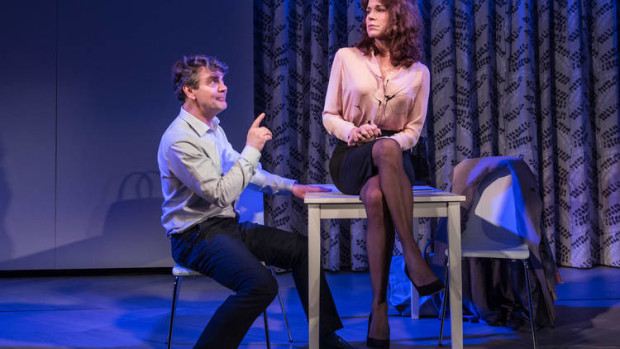You have no items in your cart. Want to get some nice things?
Go shopping
Since the momentous morning of June 24, there has been a temptation to shoehorn Brexit into everything. We should talk, write, breathe Brexit: to do otherwise is a kind of betrayal. How can we carry on as though this – and the daily unfurling of further disaster – isn’t actually happening? (Even cocooned in a world of words I see the implications, the perversion of the status quo with ugly neologisms such as “Bregret”, “Progrexit”, and now, courtesy of the LRB, “Bullxit”.)
I felt the impulse to make my opinion on the referendum known as I headed to Wyndham’s Theatre to see French playwright Florian Zeller’s The Truth, and I immediately tried to quash it. Whatever happened, I decided, I would not make this about Brexit. Please be assured, those among you who are tired of reading Brexit commentaries, that this review will not address the referendum again.
The play, the third of Zeller’s plays to be produced in English, centres on the relationships and infidelities of two married couples. Michel is having an affair with his best friend Paul’s wife, Alice; he evades the probes of his own wife, Laurence, and is shocked by the discovery that Paul knows everything and has pretended not to. The question of who is lying to whom, and about what, gives the play its plot and drives much of its humour. The Truth’s debt to Pinter is obvious, and, beyond that, it bears an echo of Wilde in its unexpected reversals, its comic paradoxes.
The play’s focus is – as its title suggests – on “the truth”. The concealment of the truth consumes the troupe of four characters, and we watch as they manipulate it in quick, accusatory exchanges. The truth, in Zeller’s world, is greasy. Hard to grasp, unfixed. We have seen him address this idea before, in both The Mother and The Father, plays which pit truths against truths in a riot of subjectivity.
It is its preoccupation with the truth which makes this production so compelling. The comedy helps, of course, but our laughter feels almost routine. I saw The Truth with a friend who observed that the humour hinges on a formula of shock (a man pulling up his boxers in bed asks the woman beside him how her husband is, for example), a formula we have encountered too many times before. We have read it, we have watched it, we have heard it in the pub with friends. It is funny – especially in the hands of director Lindsay Posner, with an amusing turn by Alexander Hanson as the self-absorbed philanderer Michel. But the humour doesn’t touch a nerve. There is something mildly dated about it (which is perhaps why Christopher Hampton’s translation feels a little formal, as though hailing from a time when this kind of comedy might have shocked us more).
The pertinence of the production doesn’t lie in its humour, but in its not-at-all-humorous suggestion that the truth is somehow malleable. We needn’t go to the theatre to witness this bending of the truth; it is being enacted on our national stage. It began the day Michael Gove announced that “people in this country have had enough of experts”, a statement which spawned a number of other anti-expert statements: lies, in other words. As we watch the Leave campaign distance itself from many of its pledges, we begin to wonder if the truth has any currency at all nowadays, or whether value only exists in well-told lies. With this in mind, a quotation from Voltaire, cited by Zeller in an interview with Mark Lawson, feels chillingly apt: “A lie is only a sin if it does harm. When it does good, it’s a very great virtue. Lie, my friends, lie. When the time comes, I’ll do the same for you.” Last month, a piece in the Washington Post examined the importance of fact-checkers who are struggling to make their voices heard in a “post-fact world”, a world of demagoguery where emotion trumps reason (and Trump, the embodiment of a fear-based, nationalist emotion, trumps reason too). I don’t think I’m sensationalising when I say that the leap from a political campaign built on proven fiction to the Orwellian pronouncements that “War is Peace” and “Ignorance is Strength” doesn’t feel very far.
Perhaps, then, I underestimated the depth of Zeller’s humour. Perhaps, unwittingly, I had been shocked, had felt my nerves touched by a play which treats the truth with the same irreverence as our own politicians. I thought that I was enjoying ninety minutes of light relief from the strange world outside the theatre’s walls – but the relevance of the production’s message has since dawned on me. Without intending to, Zeller’s play makes an alarming comment on the status of the truth in today’s political climate. It is a work for the post-fact age.
(And for those wondering how I can blithely backtrack on my promise not to make this review about Brexit: I’m sorry. Consider it my contribution to our country’s growing arsenal of Bullxit.)
The Truth continues at Wyndham’s Theatre until Sep 3. Tickets start from £22.25 from Delfont Mackintosh.

About Xenobe Purvis
Xenobe is a writer and a literary research assistant. Her work has appeared in the Telegraph, City AM, Asian Art Newspaper and So it Goes Magazine, and her first novel is represented by Peters Fraser & Dunlop. She and her sister curate an art and culture website with a Japanese focus: nomikomu.com.




